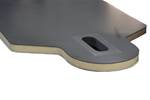Composites housing improves organ transport to save lives
Vabo Composites collaborates on novel design, supplies lighter, higher volume production housing.
Source (All Images) | XVIVO
A trusted supplier in the Dutch maritime industry for more than 20 years, Vabo Composites (Emmeloord) is best known for its lightweight yacht superstructures and serial production hatches and doors. That expertise in series composite products recently opened an altogether different opportunity in medical transport.
(Gothenburg, Sweden) provides innovative technologies and services to preserve, transport and assess organs outside the body, giving more patients the chance to receive a life-saving transplant. The company’s Kidney Assist Transport is a portable device that enables hypothermic machine perfusion (HMP) — increasingly the standard of care when preserving and transporting kidneys — combined with continuous oxygenation. Results show this device provides kidney recipients with improved renal function, fewer graft failures and reduced incidence of acute rejection and severe complications post-transplant.
In 2023, XVIVO began a process to improve the design of the Kidney Assist Transport, which is manufactured to the company’s specifications by Unitron Systems (IJzendijke, Netherlands). This included the composite housing, which measures roughly 600 × 400 × 350 millimeters and was previously made using glass fiber and polyester resin in a hand layup process. XVIVO’s nearby R&D office in Groningen reached out to Vabo Composites to explore its options. “We have a good composites network in the Netherlands and were happy to work with XVIVO and Unitron to reengineer the housing in a way that would meet all of their requirements,” explains Vabo Composites personnel.
Vabo Composites manufactures the redesigned composite housing for XVIVO’s Kidney Assist Transport system using a type of light resin transfer molding (LRTM) process, enabling higher weekly production volumes.
XVIVO’s requirements included complex geometries that enable the multipiece unit to house a variety of components, open and close easily and provide significant thermal insulation, while meeting medical industry standards including use of an approved fire-retardant resin. Equally important was the need to enable serial production of multiple housings per week.
“The shape of the interior was very challenging,” notes Vabo Composites. The company worked with XVIVO and Unitron to complete the reengineering and validate both the new design and manufacturing process through a series of prototypes. Vabo was awarded a contract for production and celebrated the delivery of its 100th housing in October 2024.
Vabo Composites chose a modified resin transfer molding (RTM) process to make the housing. Specifically, it uses a kind of light RTM (LRTM) with a set of aluminum molds. Dry reinforcements and foam are placed into the molds, which are then closed and vacuum is applied. Resin is drawn into the cavity and cured to form the composite part. LRTM achieves good process control and dimensional stability as well as high productivity. “We were also able to reduce cycle time by using robot automation to speed layup of the complex shapes as well as trimming and drilling of holes,” says Vabo. This redesign of the process significantly reduced labor hours and scaled production.
The need for donated kidneys is increasing, and XVIVO is committed to making more organs available for patients in need. Its work with Vabo Composites makes this possible.
Related Content
-
Composite innovations feature automotive, water sports, UAV and consumer project versatility
JEC World 2025: Precision, performance and reliability are at the core of Cobra International’s display, involving a front end, portfolio of water sports applications, a fixed wing drone and more.
-
Evonik showcases chopped carbon fiber-reinforced PEEK filament
Vestakeep is available at two levels of carbon fiber content and appropriate for long-term surgical implants.
-
Korean researchers develop 3D printed CNT sensors for health monitoring, flexible electronics and smart textiles
CNT-based nanocomposites are optimized specifically for vat photopolymerization-type 3D printing, maintaining high stretchability and electrical conductivity.






